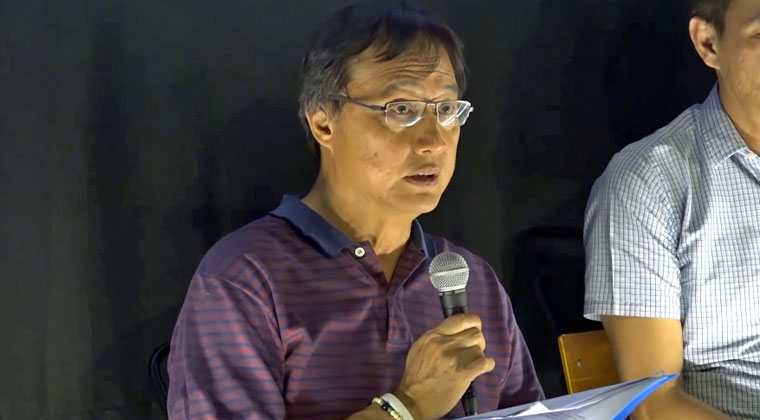You might have heard that the Aljunied-Hougang Town Council (AHTC), represented by an independent panel, is suing several Workers' Party Members of Parliament (MPs) for tens of millions of dollars.
It is alleged that WP secretary-general Low Thia Khiang, chairman Sylvia Lim and AHTC chairman Pritam Singh, all of whom are Aljunied GRC MPs, among other named defendants, authorised unlawful payments to their appointed managing agent FM Solutions and Services to the tune of $33 million.
Now, the progress and outcome of this brewing lawsuit aside, former GIC chief economist and public intellectual Yeoh Lam Keong has spoken up in response to news of the case to highlight a long-opined but still-unaddressed issue: the fact that MPs have to run town councils as part of their elected "job scope".
Yeoh took to Facebook on Thursday morning to make his points, which encapsulate quite comprehensively the problems this comes saddled with.
Here's a breakdown of what he said —
1. Here's what being a town council manager entails:
A town council manager needs specialist skills and experience to manage an entire housing estate area, which may include both private and public housing, and overseeing their respective associated facilities and infrastructure, says Yeoh.
In other words, a job for a well-resourced stat board like the HDB, which used to manage all housing estates prior to the change enacted in Parliament back in June 1988 by then-Deputy Prime Minister Goh Chok Tong.
Here's a snippet of what Goh said to justify it back then:
"If they have confidence that the candidate can look after their constituency, they are more likely to have confidence that the candidate's party can form the next government of Singapore. Certainly, if the voters cannot even trust a party to run their constituency, they will surely not want that party to form the government. They may be right or wrong in their choice, but at least they will vote in accordance with their belief that their constituency and national interests are better served with a particular candidate or a particular party."
The way things are, says Yeoh, subjects residents of an estate in a constituency to the political manoeuvrings of election cycles, to the extent of being affected by, for instance, newly-elected MPs who might not have the experience and expertise of a longstanding one who has had the chance to learn and work in an established system.
2. Here's what an MP's job entails:
On the other hand, argues Yeoh, an MP's job should be to question policies and legislation in parliament, on behalf of the residents they are elected to represent.
An MP also has to see to the needs of his or her residents, to make sure they are adequately met by relevant government agencies, writes Yeoh.
This job is done via the MP's Meet-the-People Sessions, where the MP helps file appeals on behalf of residents for certain things in their lives they need assistance with to relevant ministries or agencies.
3. And here's what it shouldn't:
"... getting bogged down by the Augean task of managing huge housing estates themselves. Especially if they have to duplicate management systems that previous incumbents refuse to share.
Not to mention the duplication of administrative resources by different electoral precincts."
(P.S. Augean is defined as "(of a task or problem) requiring so much effort to complete or solve as to seem impossible". You're welcome.)
[related_story]
4. The provision of estate management services, as well as the allocation of resources for infrastructure development and enhancement, is a public good, NOT a political tool.
The infrastructure, facilities and the quality and upkeep of a person's estate does undoubtedly contribute to the overall value of a person's home.
Also, points out Yeoh, the value of a person's home also constitutes much of a person's life wealth and savings — the average HDB-dwelling and owning person, anyway.
So if you think about it, the current system of leaving the fate of that in the hands of the people you vote to represent you parliament also leaves the government in charge of the agencies that handle this infrastructure development and enhancement.
This situation, argues Yeoh, is "both a breach of citizens' rights and a recipe for authoritarian rule".
5. Prosecuting and making (relatively inexperienced) opposition MPs financially liable for mismanagement, despite best intentions, makes it too tough for them to be of benefit to citizens.
Yeoh contends that the public, therefore, is shortchanged both ways — in estate management and political representation.
And it cuts both ways too, he adds: if the PAP ever found itself in the minority opposition, the same system they built will trap them outside as well.
Read Yeoh's full post here:
Here are totally unrelated but equally interesting articles:The Kiasi guide to surviving a mass attack of any kind
4 real life versions of comic book superpowers you used to read about in your childhood
Related articles:
Low Thia Khiang interviewed live is a masterclass on how to deal with mainstream media
Low Thia Khiang: We are prepared to be judged by the people. My conscience is clear.
HDB seeking AGC’s advice on AHTC’s lawsuit against Workers’ Party town councillors
Workers’ Party town councillors face legal actions over past payments
Top photo: Yeoh Lam Keong's Facebook page
If you like what you read, follow us on Facebook, Instagram, Twitter and Telegram to get the latest updates.
